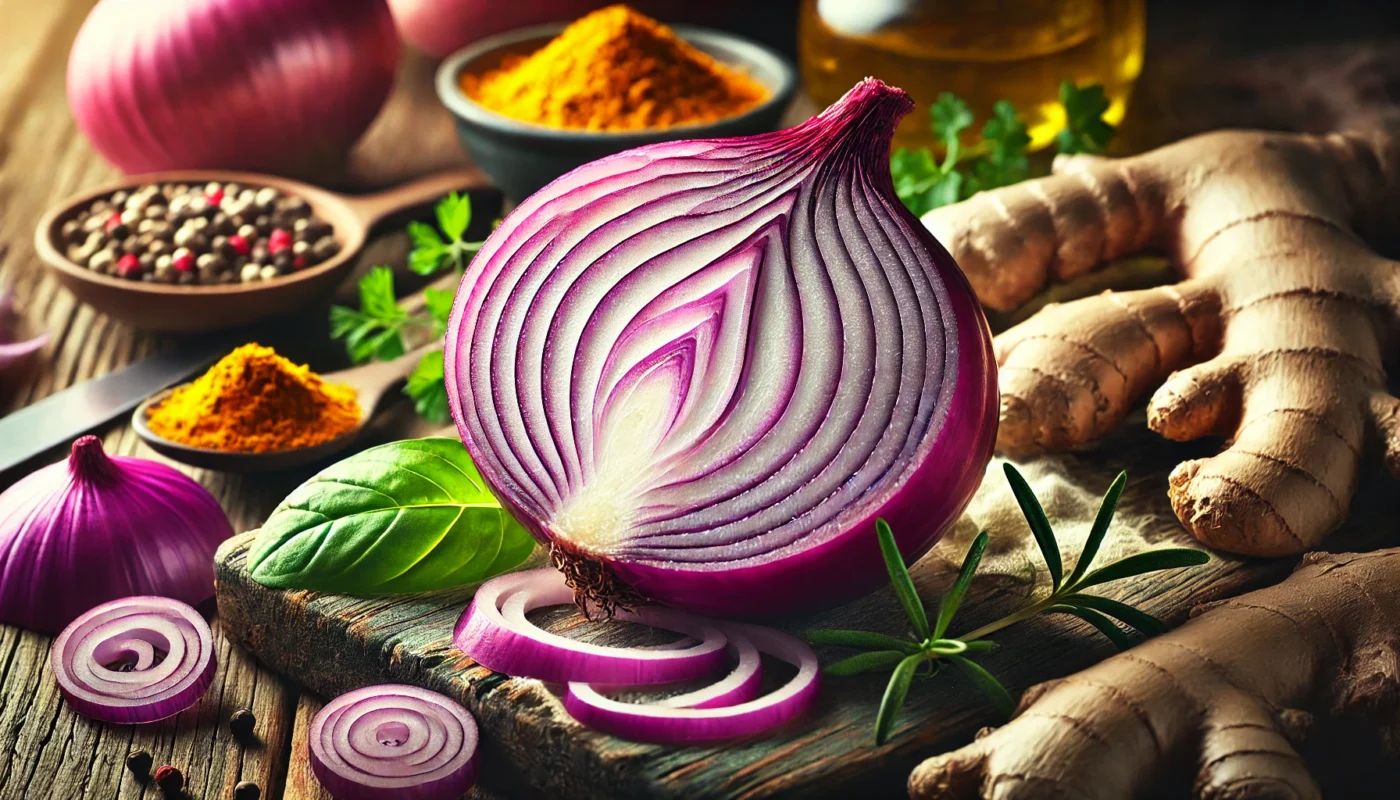Inflammation is the body’s natural response to injury or infection. While acute inflammation is a necessary part of the healing process, chronic inflammation can lead to a variety of health issues, including heart disease, arthritis, and even cancer. Therefore, managing inflammation is crucial for maintaining overall health and wellbeing.
You may also like: 20 Powerful Anti-Inflammatory Foods
Acute vs. Chronic Inflammation
Acute inflammation is a short-term response, typically lasting only a few days. It is characterized by redness, swelling, and pain, signaling the body’s healing process. This type of inflammation is beneficial as it helps the body fight off infections and heal injuries quickly. In contrast, chronic inflammation is a long-term condition that can persist for months or even years, potentially leading to serious health conditions. Understanding the difference is key to addressing and managing inflammation effectively.
Causes of Chronic Inflammation
Chronic inflammation can be triggered by various factors, including persistent infections, prolonged exposure to irritants, and autoimmune disorders. Lifestyle factors such as poor diet, lack of exercise, and stress also contribute to its development. Identifying and addressing these underlying causes is essential for reducing inflammation and preventing related health issues.
Health Risks Associated with Inflammation
Chronic inflammation is linked to numerous health problems, including cardiovascular diseases, diabetes, cancer, and neurodegenerative disorders. It can damage tissues and organs over time, leading to long-term health complications. By managing inflammation, individuals can reduce their risk of developing these serious conditions and improve their overall quality of life.
The Role of Diet in Inflammation
Diet plays a significant role in the body’s inflammatory response. Consuming a diet rich in anti-inflammatory foods can help reduce chronic inflammation and its associated risks. Onions, along with other allium vegetables like garlic and leeks, are often recommended for their potential anti-inflammatory effects.
Anti-Inflammatory Foods to Include
A diet that emphasizes whole, unprocessed foods can be highly effective in managing inflammation. Foods rich in omega-3 fatty acids, such as fatty fish and flaxseeds, and those high in antioxidants, like berries and leafy greens, are particularly beneficial. Incorporating these foods into your daily meals can help combat inflammation and promote better health.
Foods to Avoid
Certain foods can exacerbate inflammation, including refined carbohydrates, sugary beverages, and processed meats. Trans fats and excessive alcohol consumption are also known to increase inflammatory markers in the body. Reducing or eliminating these foods from your diet can significantly lower your inflammation levels.
The Role of Onions in an Anti-Inflammatory Diet
Onions are a valuable addition to an anti-inflammatory diet due to their high content of beneficial compounds. They can be easily integrated into a variety of dishes, enhancing flavor while providing health benefits. Understanding how to maximize their anti-inflammatory properties can help you get the most out of this versatile vegetable.
Are Onions Anti-Inflammatory?
Research suggests that onions possess several compounds with anti-inflammatory properties. These include quercetin, a flavonoid with potent antioxidant effects, and sulfur-containing compounds that contribute to onions’ distinctive taste and health benefits.
Quercetin: The Key Player
Quercetin is one of the most studied compounds in onions. It has been shown to inhibit the production of inflammatory mediators, thus helping to reduce inflammation. A study published in the journal Biochemical Pharmacology demonstrated that quercetin can significantly decrease levels of C-reactive protein (CRP), a marker of inflammation in the body.
Mechanisms of Action
Quercetin works by modulating signaling pathways involved in the inflammatory response. It inhibits enzymes and cytokines that play a critical role in promoting inflammation. By doing so, quercetin helps to reduce oxidative stress and protect cells from damage.
Studies Supporting Quercetin’s Benefits
Numerous studies have highlighted quercetin’s potential in reducing inflammation. Research has shown that it can alleviate symptoms in conditions such as arthritis and allergies. Its antioxidant properties also contribute to its ability to combat inflammation and support overall health.
Sulfur Compounds and Health Benefits
The sulfur compounds found in onions are also noteworthy for their potential health benefits. These compounds have been linked to a reduction in the risk of certain diseases, such as heart disease and cancer, by mitigating inflammatory processes.
Types of Sulfur Compounds in Onions
Onions contain various sulfur compounds, including thiosulfinates and sulfoxides. These compounds are responsible for the characteristic odor and flavor of onions and play a crucial role in their health-promoting properties. Understanding these compounds’ roles can help you appreciate the full spectrum of benefits onions provide.

Impact on Inflammatory Pathways
Sulfur compounds have been found to influence inflammation by modulating immune responses and reducing oxidative stress. They help to neutralize free radicals and protect cells from damage, contributing to overall health and well-being. Their effects on inflammatory pathways make them valuable allies in managing chronic inflammation.
Research on Sulfur Compounds
Studies have demonstrated that sulfur compounds in onions can reduce inflammation markers in both animal and human models. Their potential to lower the risk of chronic diseases through anti-inflammatory mechanisms is an area of growing interest in scientific research.
Scientific Studies on Onions and Inflammation
Several studies have explored the anti-inflammatory effects of onions. A study published in the Journal of Agricultural and Food Chemistry found that onion extracts reduced inflammation in animal models. Another study in Nutrition & Metabolism highlighted that regular consumption of onions could help lower inflammation and oxidative stress in overweight and obese individuals.
Animal Studies
Animal studies have provided valuable insights into the anti-inflammatory properties of onions. These studies often focus on specific compounds and their effects on inflammation markers. They help to establish a foundation for understanding how onions can benefit human health.
Key Findings from Animal Research
Research involving animal models has shown that onion extracts can significantly reduce inflammation. These studies reveal that onions can modulate inflammatory pathways and decrease the production of pro-inflammatory cytokines. These findings highlight the potential of onions as a natural anti-inflammatory agent.
Limitations of Animal Studies
While animal studies offer valuable information, they have limitations. Results may not always directly translate to humans due to differences in physiology. Further research, including human trials, is necessary to confirm these findings and determine the optimal use of onions for inflammation management.
Human Studies
Though most research has been conducted on animals, human studies also support the anti-inflammatory potential of onions. A study in the American Journal of Clinical Nutrition found that individuals with a high intake of flavonoids, such as quercetin, had lower levels of inflammatory markers compared to those with lower flavonoid intake.
Clinical Trials and Observational Studies
Human studies, including clinical trials and observational research, provide compelling evidence for the benefits of onions. These studies often involve dietary interventions and assessments of inflammation markers, offering insights into how onions can be effectively incorporated into a balanced diet.
Implications for Public Health
The findings from human studies suggest that increasing onion consumption could have significant public health benefits. By reducing inflammation and associated disease risks, onions may contribute to improved population health outcomes. Understanding these implications can guide dietary recommendations and public health strategies.
Future Directions in Research
Ongoing research aims to further elucidate the mechanisms through which onions exert their anti-inflammatory effects. Future studies may explore the impact of different onion varieties, preparation methods, and dosages. Continued investigation will help refine our understanding of how to best utilize onions for health promotion.
Practical Ways to Incorporate Onions into Your Diet
Incorporating onions into your diet is a practical and effective way to harness their health benefits. Here are some tips:
Raw Consumption
Eating raw onions can provide the maximum amount of quercetin and other beneficial compounds. Add them to salads, sandwiches, or salsas for a flavorful crunch.
Benefits of Raw Onions
Raw onions retain the highest levels of beneficial compounds, making them an excellent choice for maximizing health benefits. Their crisp texture and pungent flavor can enhance a variety of dishes, offering both nutritional and culinary advantages.
Creative Ways to Enjoy Raw Onions
Incorporating raw onions into your meals can be both simple and delicious. Try thinly slicing them for salads, mixing them into guacamole, or layering them in sandwiches. Experimenting with different recipes can help you discover new ways to enjoy this versatile vegetable.
Considerations for Raw Consumption
While raw onions offer many benefits, some individuals may find their strong flavor overwhelming. Gradually incorporating them into your diet and pairing them with complementary ingredients can help you acclimate to their taste. Additionally, consuming raw onions with food can help reduce any potential digestive discomfort.
Cooking with Onions
Cooking can alter the chemical composition of onions, but they still retain many health benefits. Sauté them as a base for soups, stews, or stir-fries.
Nutritional Changes During Cooking
Cooking onions can lead to changes in their nutritional profile, affecting the availability of certain compounds. However, cooked onions still offer significant health benefits, including antioxidants and essential nutrients. Understanding these changes can help you make informed choices about how to prepare onions.

Delicious Recipes Featuring Cooked Onions
Cooked onions add depth and richness to a wide range of dishes. They can be caramelized for a sweet and savory addition to burgers or pizzas, or sautéed as a flavorful base for sauces and casseroles. Exploring different cooking techniques can help you appreciate the versatility of onions in the kitchen.
Tips for Cooking Onions
To maximize the health benefits of cooked onions, use gentle cooking methods and avoid overcooking. Sautéing onions over low to medium heat can help preserve their beneficial compounds while enhancing their natural sweetness. Experimenting with different cooking methods can help you find the perfect balance of flavor and nutrition.
Onion Juice or Extract
For those who may not enjoy the taste of onions, onion juice or extract can be a viable alternative. These products often concentrate the beneficial compounds found in onions.
Health Benefits of Onion Juice
Onion juice is a concentrated source of the beneficial compounds found in onions, offering a convenient way to boost your intake. It can be consumed on its own or added to smoothies, dressings, or marinades for an extra nutritional boost. Understanding the benefits of onion juice can help you incorporate it into your wellness routine effectively.
How to Make Onion Juice
Making onion juice at home is simple and allows you to control the quality of the ingredients. Start by blending peeled onions and straining the liquid through a fine mesh sieve or cheesecloth. Store the juice in an airtight container in the refrigerator for up to a week.
Commercial Onion Extracts
Commercial onion extracts are available in various forms, including capsules and liquid concentrates. These products can be a convenient option for those looking to increase their intake of onion compounds without the strong taste. Choosing high-quality extracts from reputable sources ensures you receive the maximum benefits.
Variety Matters
Different types of onions, such as red, white, and yellow, contain varying levels of beneficial compounds. Incorporating a variety of onions into your diet can maximize their anti-inflammatory effects.
Exploring Different Onion Varieties
Each type of onion offers unique flavors and nutritional profiles. Red onions are rich in anthocyanins, white onions have a milder taste, and yellow onions offer a balance of sweetness and pungency. Trying different varieties can add diversity to your meals and enhance their health benefits.
Combining Onion Varieties in Meals
Using a combination of onion varieties in your cooking can elevate the flavor and nutritional value of your dishes. Mix red and yellow onions for a colorful salad, or use white onions for a subtle addition to delicate recipes. Experimenting with different combinations can help you discover new culinary favorites.
Seasonal Availability and Selection
Onions are available year-round, but their flavor and quality can vary with the seasons. Choosing onions at their peak freshness ensures the best taste and nutritional benefits. Shopping at local farmers’ markets or selecting seasonal varieties can enhance your culinary experience.
Potential Side Effects and Considerations
While onions are generally safe for most people, they can cause digestive discomfort in some individuals, particularly those with irritable bowel syndrome (IBS) or other gastrointestinal conditions. Additionally, onions may interact with certain medications, such as blood thinners, due to their sulfur content. It is advisable to consult with a healthcare professional if you have concerns.
Digestive Sensitivity
Some individuals may experience digestive issues when consuming onions, particularly in large quantities. Symptoms can include gas, bloating, or stomach discomfort. Identifying your personal tolerance level and adjusting your intake accordingly can help you enjoy onions without discomfort.
Managing Digestive Discomfort
If you experience digestive discomfort from onions, consider starting with small amounts and gradually increasing your intake. Cooking onions can also reduce their potential to cause digestive issues. Pairing onions with foods that aid digestion, such as ginger or peppermint, can provide additional relief.
Alternatives for Sensitive Individuals
For those who cannot tolerate onions, alternatives such as shallots, chives, or leeks may be suitable substitutes. These options offer similar flavors and health benefits without the same level of digestive irritation. Exploring alternative ingredients can help you maintain variety in your diet.
Medication Interactions
Onions contain compounds that may interact with certain medications, affecting their efficacy or increasing side effects. Understanding these interactions is important for individuals taking prescription or over-the-counter drugs.
Common Medication Interactions
Onions may interact with medications such as blood thinners, anticoagulants, or medications that affect blood sugar levels. It is important to consult with a healthcare professional if you are taking these medications and wish to increase your onion intake. Monitoring your health and adjusting your diet as needed can help prevent adverse effects.
Consulting with Healthcare Providers
If you have concerns about how onions may interact with your medications, it is advisable to speak with a healthcare provider. They can provide personalized guidance based on your health needs and medication regimen. Regular check-ins with your healthcare team can ensure you are making informed decisions about your diet.
Individual Variability
People’s responses to onions can vary widely based on individual health, genetics, and dietary habits. Recognizing this variability can help you make tailored dietary choices.
Factors Influencing Onion Tolerance
Genetic factors, existing health conditions, and dietary patterns can all influence how individuals tolerate onions. Understanding these factors can help you make personalized decisions about incorporating onions into your diet. Tracking your responses to different onion preparations can provide valuable insights into your individual tolerance.
Importance of Personalized Nutrition
Personalized nutrition recognizes that each individual has unique dietary needs and responses. Embracing this approach can help you optimize your diet for health and well-being. Working with nutrition professionals can provide additional support in creating a diet plan that aligns with your goals and preferences.

Conclusion
Onions, with their rich content of quercetin and sulfur compounds, offer significant anti-inflammatory benefits. By understanding the science behind these effects and incorporating onions into your diet, you can take proactive steps towards managing inflammation and enhancing your overall health.
Whether you’re a fitness enthusiast seeking to optimize your diet, a health enthusiast exploring holistic approaches, or a medical patient looking for practical dietary tips, onions can be a valuable addition to your health and wellness journey. Their versatility and health benefits make them an accessible and effective option for combating inflammation and promoting well-being.
The Broader Implications of Onion Consumption
Incorporating onions into your diet not only supports individual health but also contributes to broader public health goals. Encouraging the consumption of nutrient-rich foods like onions can help reduce the prevalence of chronic diseases and improve population health outcomes.
A Call to Action for Healthier Living
Taking small, consistent steps to include anti-inflammatory foods like onions in your diet can lead to meaningful health improvements. Embracing a balanced, whole-foods-based diet and making informed dietary choices empowers you to take control of your health and well-being.
Final Thoughts
Onions are more than just a culinary ingredient; they are a potent ally in the fight against inflammation. By understanding their benefits and incorporating them into your lifestyle, you can enjoy both delicious meals and improved health. Embrace the power of onions and embark on a journey toward a healthier, happier you.
Further Reading:
9 Tasty Ways to Alleviate Pain and Build your Bones!
Top 10 health benefits of onions
Stop the Tears: Why Onions Are Good for You
onion juice, health benefits of onions, anti-inflammatory foods, onion varieties, digestive health, medication interactions, personalized nutrition, cooking with onions, nutritional compounds, whole foods diet
Important Note: The information contained in this article is for general informational purposes only, and should not be construed as health or medical advice, nor is it intended to diagnose, prevent, treat, or cure any disease or health condition. Before embarking on any diet, fitness regimen, or program of nutritional supplementation, it is advisable to consult your healthcare professional in order to determine its safety and probable efficacy in terms of your individual state of health.
Regarding Nutritional Supplements Or Other Non-Prescription Health Products: If any nutritional supplements or other non-prescription health products are mentioned in the foregoing article, any claims or statements made about them have not been evaluated by the U.S. Food and Drug Administration, and such nutritional supplements or other health products are not intended to diagnose, treat, cure, or prevent any disease

